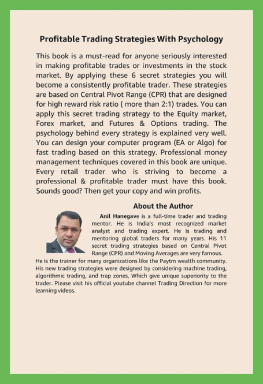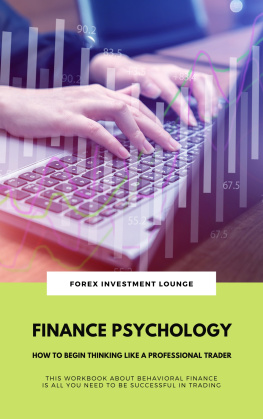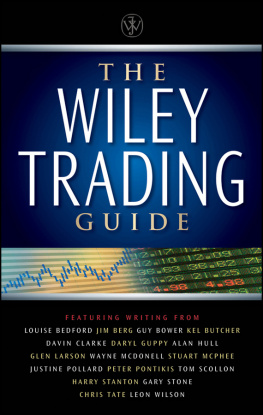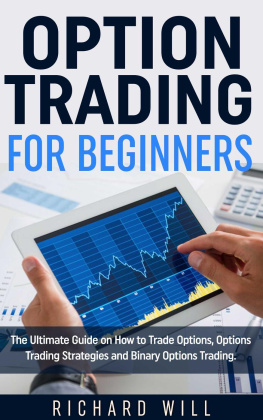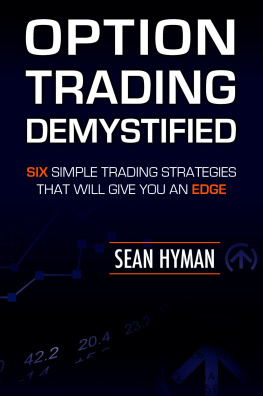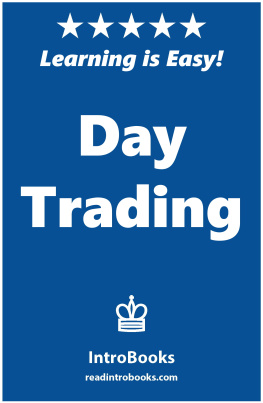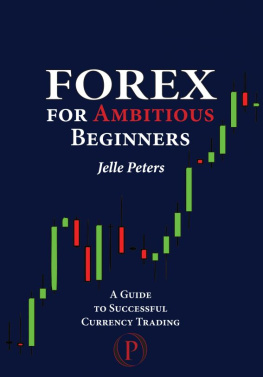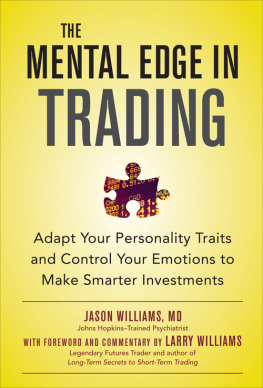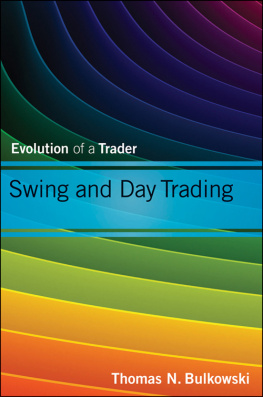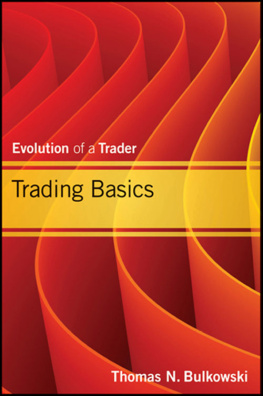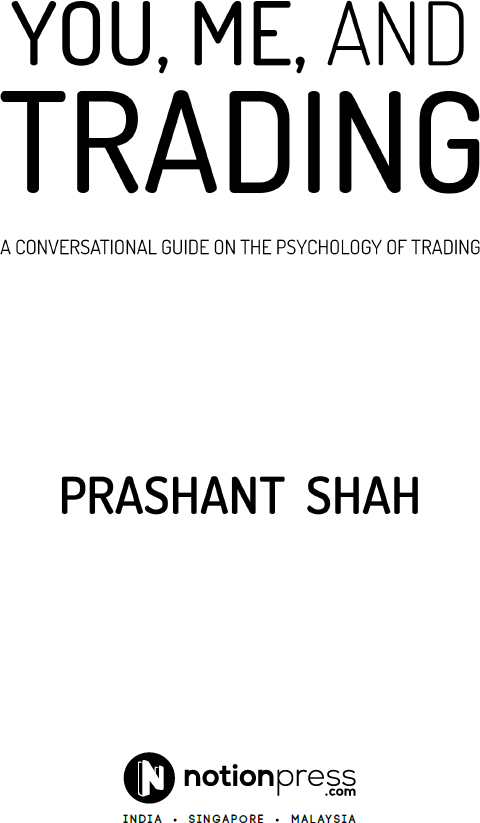Chapter 5
Policy
Me: You said we shouldnt focus on the outcome. There are methods to derive targets of the stock or any instrument. They help at times while trading. But should we not to look at them?
You: That is a part of the method, not the outcome. Your exit criteria can be based on trailing stop-loss mechanism or when a target is reached. The target then becomes a part of the trading process. You need to stick to the rules and focus on the execution.
Me: But if I book profit at the target price, then I am looking for the certain outcome, right? My focus will naturally be drawn there in that case.
You: Right. But if you dont look at shadow P&L and exit the trade based on your method or some pre-defined criteria, then you are following the process and practicing the technique. Those are not emotional decisions influenced by the focus on the outcome.
Me: Got it. I think booking the loss is a toughest thing to practice.
You: Right. You need to remind yourself repeatedly that you cant make money in every trade. Give up the desire to achieve that. Accept the fact that you must book loss also at times.
The intelligent trader would be aware that booking the loss is an important ingredient of a successful trading system. You dont make money by booking the profit, you make it by exiting the stock at the right time and booking the loss. You cant run a car at a higher speed just because there is an accelerator; you can do it if the brakes are under your control. Bad deals are part of the business. An intelligent businessperson knows that if something is not working, they must exit and focus their energy on whats working. Life, business, and trading is a game of probability.
If you tell yourself this repeatedly and understand this part of the game, you will be able to accept it and escape the losing trade. Have the bigger picture in mind and remember that the current trade is just another trade in a series of trades you will be taking in your journey.
You need to continuously remind yourself about good trading principles. Even athletes and sportsmen work with psychologists to remain focused. Collect some of their best quotes and save them in a folder to read periodically or whenever you feel distracted.
Me: Thats true. I win some, I lose some. But my win trades need to be more than my losses to make money over a period. When I am seeing frequent losses, then it becomes a serious problem.
You: Youre absolutely correct. Do you know in advance which trades will work and which will not?
No.
You: That means you dont have control over the outcome. Even if your method is well-practiced or tested, the sequence of outcome is not in our control. To take advantage of our system, we have to remain consistent. It is possible that five out of ten will be in your favour, but the sequence of P&L is not in your control. Your job as a trader is to take all of those ten trades.
Then, you must cut the losses early and ride the winners, especially if you want to be a trend follower. Your strategy can also involve cutting the winners early and improving your win ratio. There are different types of philosophies and different strategies for trading and investment.
Again, market phases are cyclic. It is right that you feel bad when you make losses, but you must know that the drawdown is because the market phase doesnt suit the strategy you are following. It doesnt mean the strategy has a problem.
Me: Thats right. But what if the strategy I opted for does not working anymore or market phase has suddenly changed so the strategy is not effective? It is also possible that I might not have studied enough. Now, when the loss is occurring and I dont pay attention, Ill not be able to correct my strategy at the right time.
You: That is a very valid question, but that is also a part of this business. Strategies and methods we follow must continuously improve with our learning.
You might have had these kinds of doubts when your trades go through a bad phase. But dont let that affect your execution. Wear the fund manager cap and analyse it only during the review meeting.
Me: Why cant fund manager be active while trading?
You: Because his analysis will be mostly outcome-driven then. Let him think only when there is a time to review or at a pre-defined time interval. Dont do it daily even if you are a very active trader. Try to use the weekends when markets are not open and your thought process will not be influenced by the markets movement. It will help you not to overthink.
Me: But analysis can be a part of the process that needs constant thinking.
You: That would be a part of the process and the method you are following. When it is about changing the strategy or methods or redefining the process, it shouldnt happen frequently. Please understand the difference. Any type of analysis can be a part of your method, but it shouldnt be outcome-based. Otherwise, you will keep learning wrong lessons and remain stuck in the endless cycle of confusion.
The major problem in the market is that you are free to operate and act as per your mood. And mood swings are frequent and placing an order is just a click away. If you take decisions based on mood swings, you will indulge in overtrading, revenge trading, or other such types of emotional trading.
Many traders are not even aware of this major issue with trading and markets. What will happen if there are no rules to behave in a certain way in the society? We all will behave like animals in a jungle. That animal inside you is active while trading and there is no one to control it. It is important to regulate it.
You need to work on the rules that would govern yourself while trading. I suggest making a policy document of your fund house.
Me: Policy document?
You: Like a country is governed based on its constitution and law and order are maintained as per the legal policies, the fund house and manager need to be governed by a policy document, maintained by the fund manager. It should have a rule book and the principles to be followed.
A rule book is how you will take your trades. It can be based on any method, be it technical or fundamental analysis. It can be subjective or objective. It is also required if you are following someones recommendations or merely speculating.
You can decide the format of your rule book, but it must have clarity on the following aspects:
- Which instruments and markets you will trade (your trade universe)
- Which time frame you will trade and the chart settings (if based on the chart analysis)
- Entry criteria and process
- Exit criteria and process
- Re-entry criteria and process
While writing the criteria, try to be as specific as possible. These rules will be instructions given to the trader. Write in terms of Dos and Donts. There shouldnt be any ambiguity. Words like Sometimes or It depends shouldnt have any place in the rule book. Strategies can be changed or tweaked, but they must first be changed in the rule book and then implemented by the trader.
The principle book should have some basic principles underlined that you will follow, irrespective of the strategy. A few examples of the principles are as follows:
- I will not take a leverage.
- I will not allocate more than 5% to a stock in the portfolio.
- I will follow breakouts and trends in outperforming stocks.
The strategy and the method are mentioned in the rule book.


